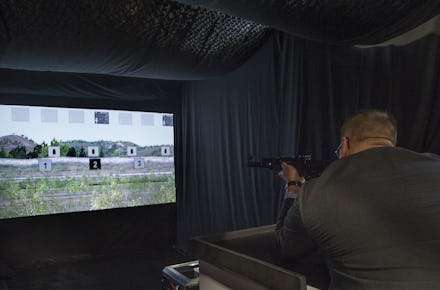Racist Shooting Target Chillingly Sums Up the Hostility Facing Black America Today

Few pastimes are more American than racism and target practice, so the latest news from Sioux Falls, South Dakota, probably shouldn't surprise anyone.
KSFY-TV reports that this weekend's Collector's Classic Gun Show had to eject and then ban a vendor for selling "Runnin' Nigger" shooting targets — that is, sheets of gun range paper emblazoned with a black child's running silhouette.
Does the story get worse? Of course it does. When confronted by KSFY's news crew, the vendor — who did not give his name — staunchly defended his product:
"Aren't [those targets] offensive in nature?" the videographer asks.
"To who?" the vendor replies. "Are you Negro? You know, there's some black people and then there's some Negroes ... sold 500 of [the targets] this weekend, so what difference does it make?"
It's hard to imagine a more apt symbol for the hostilities facing black America today.
In a way, the vendor's candor is refreshing. Americans' seeming inability to recognize systemic racism makes it a hard topic to discuss, but the lack of subtlety embodied by a literal "black person" shooting target leaves little room for ambiguity. The message is clear: "We want to picture killing you." What better way to fuel a racist imagination than enabling it to fantasize ending black life?
This isn't the first time such a product has made headlines: Just two months ago, a police department in North Miami Beach, Florida, was caught using mugshots of black arrestees for target practice.
In April 2013, a Florida police sergeant came to work with two shooting targets designed in the image of Trayvon Martin, the black 17-year-old murdered by George Zimmerman in 2012. The target was manufactured by the Hiller Armament Co. out of Virginia Beach, Virginia, the Washington Post reports. That is to say, these are consumer products. There's a market for them.
Money to be made: This is important, because an under-addressed element of the recent slayings of black men by police and vigilantes is the financial support that's swelled around their triggermen. Zimmerman raised $200,000 through his personal website after killing Martin. Darren Wilson, the Ferguson, Missouri, police officer who killed 18-year-old Michael Brown last August, had $500,000 basically thrown at him, raised by supporters through a GoFundMe account.
There's money to be made here, as the targets and the above examples indicate. But then again, racism wouldn't persist if it weren't profitable for somebody.
Nevertheless, it would be a mistake to point at these people — both the shooters and their supporters — and say, "This is what racism looks like." It wouldn't be false, but it would reinforce a misleading American impulse wherein the only racism we recognize is the kind that's screaming in our faces. Institutional racism is real. Systemic racism is real.
But black gun range targets? Those are real too and they're a potent reminder for those who claim the "real racists" are the people who talk about race at all. Such incidents remind these naysayers, in no uncertain terms, why denying racism's existence is a willful distortion of truth. Their meaning is tough to dispute: These are literal images of black people being bought and sold for shooting practice.
If that's not clear enough indication that racism exists, it's hard to imagine what is.